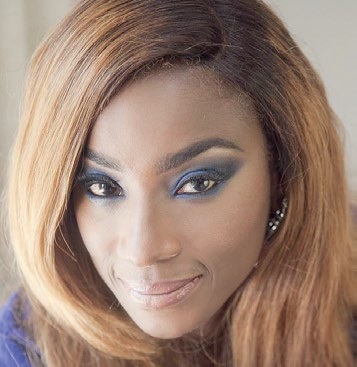Yemisi Wada is a woman of many parts. She is not only a lawyer, an advocate for street children, but also a movie producer, among other things. In this interview with IVORY UKONU, she talks about some of the movies she has produced, her passion for film-making and what she is currently working on. Excerpts:

Not many people know that you are a full-time movie producer. What movie are you working on?
It is titled ‘Lasgidi Cop.’ We did the first part in 2016 and licensed it to DSTV for three years and then it went round all the other stations like Africa Independent Television, AIT etc. I felt happy with it because it was my second outing at movie production after ‘Oluranlowomi,’ a documentary on Street Kids.
‘Lasgidi Cops’ is a crime series and the first of its kind at that time. It was fully funded by me. It had a good run while it lasted. Ever since then, I have been trying to do a season two of it but the cost of production has gone up. We have been through a recession, our currency has gone down and I needed funding to get it done. I didn’t make any profit from the first one I did. I was very sceptical about Bank of Industry funding because I didn’t quite understand how it works and so I stayed off borrowing as I didn’t want to get involved in anything I couldn’t guarantee its profit.
Luckily, not too long ago, I attended a summit in Paris, France where I was made to speak about my experience producing ‘Lasgidi Cop.’ It was more like a pitch. I came back to Nigeria and a few months later, I was told a French production company was interested in the series.
Later that year, I met up with the production company in London and they said they liked what I had done using my own money and saw the potentials of it being funded with them as partners. So we had a development agreement where we both co produce. I produce for them and they fund and distribute it. Just after that, COVID-19 happened. Although we had signed the agreement, the production didn’t happen. But post COVID-19, we started again.
We have just finished writing the script and editing it so now we are looking at a good time for actual production to start. Luckily, all the stars that featured in the first installment are coming back but this time we are producing it as an original rather than a season two, meaning we are starting all over again.
Will it have the same story line?
Well, it is a crime series. So yes, it will have the same theme. It is about crime happening in a metropolitan city like Lagos. But this time, it won’t be solely based on the Police system as we operate a federal style of policing here. It will be called, ‘Lasgidi Cop – Special Crime Series.’ There is an imaginary special crime unit that has been formed to deal with serious crimes in Lagos while also interfacing with Special Crime Units in other states. So, we are broadening the scope but it is mainly about solving crime in the metropolitan city of Lagos.

You are a trained lawyer. Why the interest in a crime series?
My productions are all tied around advocacy. Like my first production, ‘Oluranlowomi’ which means, ‘My Benefactor,’ it addresses the plight of street children to create awareness for the cause. It was a true-life story about four young boys, how fortunate they were and how the tables turned around for them. It showed how their lives could turn out depending on what help they get, good or bad.
It was borne out of the work I do with my foundation, Haven for the Nigerian Child foundation, which I set up in 2008 to provide succour to children who have taken to the streets for one reason or the other. The focus of the NGO is ‘A street is not a home’, hence we form a relationship with these street children, take them back home and with help, try to fix the problem that led to their taking to the streets, which are very often financial. We take over the welfare of that child with the help of our various sponsors.
‘Lasgidi Cop’ was triggered by an incident. One of my daughters lost her phone in the United Kingdom. It was a contract line and because it was insured. She needed a police report to replace the SIM and all what not. But I was sceptical about going to a police station in Nigeria for the report because we all know what police stations are like here. But we did go and what shocked me was that there are different people doing different things, just like any normal office. There are departments for different kinds of issues and it just occurred to me that there are people in Nigeria who will never know the proper function of a police station.
We run away from police stations because they are filthy, they are not welcoming, there is so much corruption. You can go in to report a crime and you end up being the accused. But after that visit, I yearned for people to know the actual function of a crime officer and I tried to project that in the movie, in a way that I am not stoking a controversy or calling for state police.
I also have another drama series on Youtube. It is a web series titled ‘The Witches’ and it is about a group of female friends living the cosmopolitan lifestyle in a city like Lagos. I have younger friends in their 30s, 20s and things are fast changing. When I was their age and even when I got separated from my first marriage, I couldn’t just rent an apartment all by myself. I had to move back in with my parents so as not to be seen in a certain type of way. But these days, 20, 30-year-olds live alone. It has become common place nowadays, unlike the past. The series is comic and it addresses issues on women who suffer from Pre-Menstrual Syndrome, PMS, the idea of kept women, mistresses, etc. So there is advocacy in everything that I produce, deliberately or inadvertently.
Why did you quit your legal practice for movie production?
I had been out of the legal profession for a while because I was married and bringing up children. So my mates at the bar had pretty moved up their career ladder ahead of me. Then I became a single mum and it was very difficult to raise three children on a litigation salary. It was poor. However, it is not all totally goodbye to law because the beauty about law is that you are a lawyer every day. It doesn’t ever leave you because you are applying it in every aspect of your life. The only difference is that I am not practicing it professionally.
Do you regret not practising law?
In Nigeria? Hell no. I have had a terrible experience with the judiciary. So I do not regret it at all.
Didn’t your famous dad have a chamber where you could have worked?
No he didn’t. He was a judge employed by the government and worked with the ministry of justice. By the time I returned after my studies in England, he was already a judge. So back to my narration, I set up a law firm, Summit Chambers, but I found it too tedious and it was difficult to make ends meet. So I went into business. I was a jack-of-all-trade, I did everything and anything to survive. It was after I remarried that I started my NGO and did the documentary on street kids because I was trying to raise public awareness about the kids. I would say the bug bit. I thoroughly enjoyed the process of movie production and I liked the impact the documentary made. And now, I find that at my old age, is where I found what the Bible says about making money doing what you enjoy doing. I am passionate about movie production. It is my escape and I even edit scripts free for people who reach out to me for their honest opinion.
Are you thinking of producing a feature movie?
I have one that I am really passionate about. It is a Yoruba epic series and it is being written at the moment. I just came back from America where I got funding for it. I am very excited about it, but it turns out that the story is long it can’t be a feature movie but a series. But I do plan to do a feature film, perhaps after these projects I am working on.

What are those things that you believe mitigate against the growth of the movie industry?
A lot of things do, but most important, we do not have enough support from government. In every other part of the world like in the United Kingdom, if you have an idea, there is a government body you pitch it to and they support you. With that support, you are not desperate to just churn out anything in the name of making movies. I will give you an example.
An old school mate of a young brother of mine produced a movie, ‘The Milkmaid,’ which dwelled on the insurgency up North, did so well that it was Nigeria’s nomination to the Oscars. The movie got to the second to the last stage of the whole Oscar process, but there was no government support. They were looking for funding because when you are putting your film up for the Oscars, you need to lobby, show them the film, engage them, it is all money and they needed that extra funding. It was a wonderful film. Now let me shock you further.
During the premiere, which was done online because of COVID-19, the Minister of Information didn’t even show up for the zoom premiere. He was invited and for a film that was nominated for the Oscars, the man whose responsibility it is to help project Nigeria positively, did not show up. The year after, Korea had a film in the Oscars and Korea was in Los Angeles lobbying for that movie. The movie producers had the support of their country because it was a national thing. Apart from winning in the Best Foreign Film category, it won in the Best Film Picture category.
We do not get the support that we need. We also do not have enough cinemas. All these box office touting N300 million, N500 million sold out, I am thinking from where? It doesn’t make any sense because we do not even have enough cinema houses and how many Nigerians actually go to the cinema?
The most expensive cinema tickets is N5000. Even the cinemas available, the foreign films get more showings in them than the indigenous ones. So where is the N100 of millions coming from? So this makes me a bit sceptical because we really need to know the true numbers we are dealing with to be able to get adequate funding for movie production.
What are your thoughts on Nollywood becoming an all-comers affair?
I feel that again, in anything that you do, you want to make your money back. If you are not going to get any support and you are going to use other people’s money, then you need to find means to get the most return on the money. That being said, we are creatures of habit. I think we are just generally a lazy nation, we celebrate mediocrity a lot and in anything we do. If you criticise or air a contrary opinion, people assume there must be something wrong with one. But I believe that with time, it will get better.
Now we have streamers tapping into our movie industry, our movies are going international, people are looking at getting international recognition via awards like the Oscars. So, when you want to compete internationally, you need to apply international standards. You can tell with the quality of our films that we are getting more adventurous. So sooner or later, it will get better, and the wheat will be separated from the chaff.
With your sights focused on movie production, what happens to your NGO?
It is still active. To maintain its capacity, we have not put in more children but what we do is to maintain the care we give to the ones we have taken off the street. By extension, we are also looking after parents that are in charge of the children under us. A lot of them are grown now and working. There are younger ones who are still in school. Unlike when we started and we would visit the Kuramo beach to get these kids off the street, now we have referrals, that is, children being brought from outside Nigeria or from northern Nigeria.
Do you have a home where you keep them?
No, we always take them back to their home because I still believe that the home is the best place to train up a child. Luckily, most of these children we take off the street are opportunistic children. So they are keen to make a living. I am also glad that because of the Child Right Act of Lagos State, it is not commonplace to find as many children on the streets as before. So the law is actually helping us tackle that aspect.
Can you recount one success story with these street children you salvaged?
I will tell you about six success stories. When the boys complete their schooling, we send them to a technical training institute in Lagos. One of them did a course in computer science. Another one, Idris Modupe took some professional exams, passed in flying colours. He currently works in Eko Hotel in charge of lighting. Then another did something in communication while the fourth took an exam on web design. He takes care of our online presence and things like that. He is doing so well. He has built a house for himself in Ikorodu, financed his sister and they both co-own a clothing line. Then there is Musiliu who works with MTN Nigeria and in the department that handles the construction of their communication mast. He is married and is a father now. Then there is Isaac who trained on how to fix aluminium stuffs. He is a boxer and now he has a show on GOTV.
Do you help them to get these jobs?
Yes, we do sometimes, but what is funny is that these kids have gainful employment, while I have relatives with many university degrees, yet can’t get jobs. One thing I have learnt from this is that university education is not for everybody. It is more important to learn a trade that you are good at and have the qualifications and experience. And the jobs are there. Companies like Nestle, Guinness, Nigerian Breweries go to this instituter to poach them.
You have been married for 21 years. What has kept the marriage going for so long?
We are each other’s friends. Like every couple, we go through swing periods. Today it’s high up there, tomorrow, it’s low, but I think that at the end of the day we have each other’s back, whether we are together or not because of where we are coming from. Again, I know who he is and I have a very good idea of who I am in his eyes and vice versa. We are completely different in many ways. I am a Lagosian, a socialite and I love to party, but he hates parties. When I am getting dressed up for a party, he will do everything possible to make sure I get ready and at the end, he will say thank you. The thank you is for not asking him to come with me to the party. To another couple, that could be different and misconstrued, but I know that, that is not him and I do not need to put him through that to announce to the world that we are together.
How did you meet him?
I met him in London through some friends. It is funny because I thought he was someone else. It was a comment I made and a reply to that comment and we picked it up from there.

In this age and time where marriages end, even before they are contracted, what advice would you give to young couples hoping to stay married?
I have heard young people say my generation has scared them off marriage. They say what we do to stay married is akin to slavery but I say to them that marriage is like a membership club where to retain your membership, the man and the woman must be ready to love each other in sickness and in health, the woman must be submissive to the man and the man must be able to look after the woman. That is the premise of the ‘membership’. If you do not believe in those membership rules, then do not join the club. But if you must join the club and you start adjusting or shifting the rules, then there would be problem. Again, it is not love that keeps a marriage. It takes a dogged determination to be together because you both want to be together. So there should be respect, deep affection, patience and endurance. And you can’t do it by taking each other for granted.
You are a grandmother of two. What is the secret of your good looks?
I am lucky that I got good genes from both sides of my parents. But more importantly, I am at peace with myself. I dance to my own tune, I follow what I believe in, I am not looking to please anyone but God. As I get older, I have a beautiful relationship with God that I did not know was possible. Above all, I have five children who are millennials and what you would refer to as Gen Z, so go figure. But I thank God.





